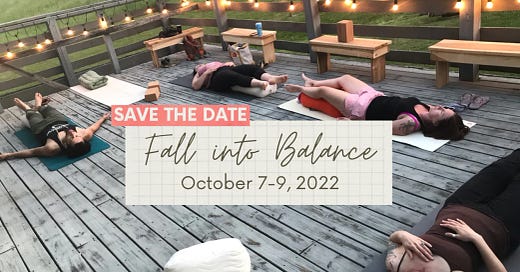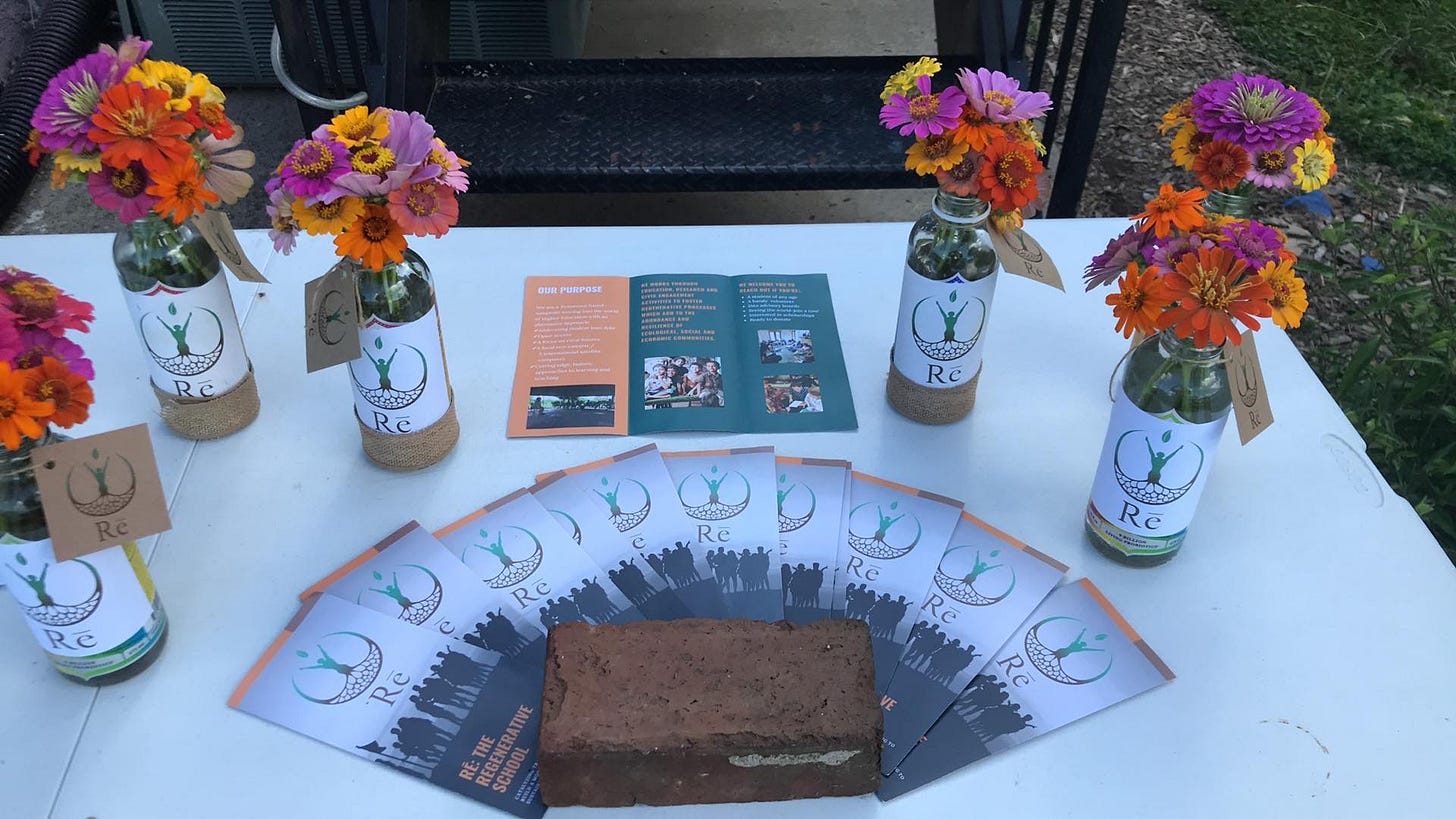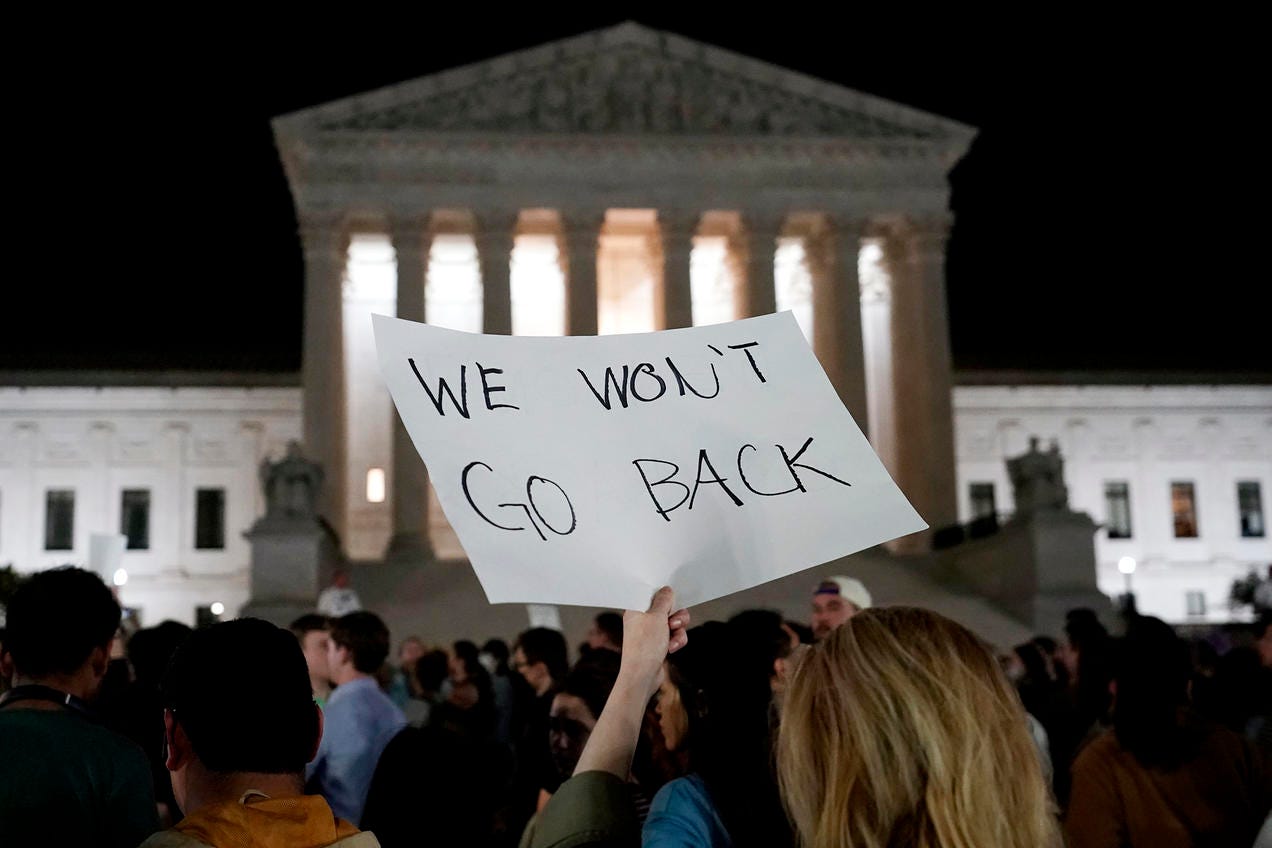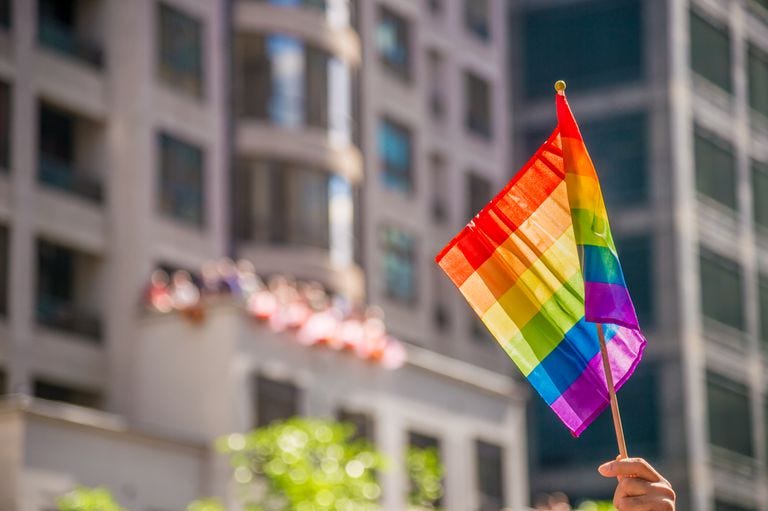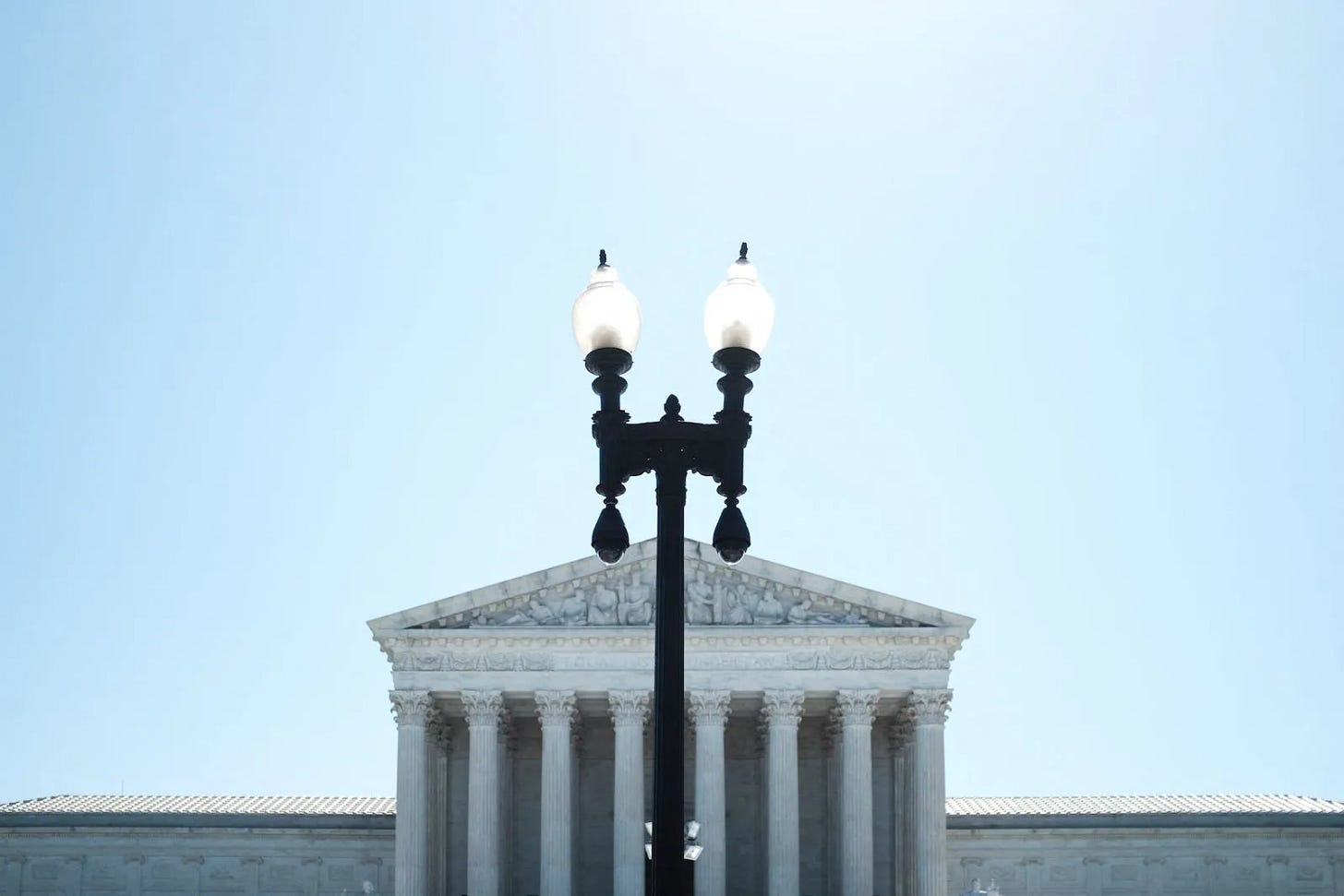The RēMind, No. 028: RēIntegrating Reproductive Justice Into Climate Change Action
Rē Updates/Climate Crisis As Reproductive Justice Issue/Climate Policy: Women Must Control Their Bodies/Pride Flag's Connection to Environment/Reproductive Justice in Climate Research/SCOTUS vs EPA
In this week’s newsletter, we explore the intersection of reproductive justice and climate change.
Since the last time this offering reached your inbox, the Supreme Court of the United States (SCOTUS) has overturned both Roe v. Wade and West Virginia v. EPA, effectively ruling against the Environmental Protection Agency’s authority to regulate greenhouse gas emissions from power plants and a woman’s right to choose. The consequences are as far-reaching as the disappointment and grief we feel at the moment.
How can we regenerate hope, action, and engagement in the face of fear?
Read ahead, friends. Keep fighting and keep loving.
Updates from Rē:
Fall Retreat Announced: October 7-9, 2022
Mark your calendars! We are happy to announce another retreat offering for the upcoming fall season.
Thana Nu of Nourish Me Wellness, Caitlin Smith of Within Wellness,
and Ashlei Laing of Rē : The Regenerative school will meet again at our farm to hold space and guide us into balance. This retreat will be a fresh experience for all those interested in Ayurveda, yoga, soulful nourishment, self-care, and rēconnection to mind, body, and nature. Our wonder team might even be joined by a special guest guru. Watch this space for more details and signups!
Navigating Life After Roe in Tennessee
This Thursday we held our first virtual event with Bans Off Our Bodies, a Planned Parenthood Action Fund, and friends to help inspire action and self compassion during this dark chapter. Thank you to all who joined.
Caitlin Smith of WithinWellness, shared some meditation and self care practices to help us ground during uncertain times. Stephanie Britt, a registered dietitian and local county commissioner, shared the importance of community care and political engagement as we march forward into a fight to elect representatives that stand for reproductive justice and choice. Lora Phillips Hortert, a paralegal from Bans Off Our Bodies, shared her powerful story and argued how standing for life IS in fact standing for choice. And Jonathan Fagan, a Nashville attorney, explained the legal ramification of overturning Roe v Wade, and the likely future of Tennessee’s state legislature on reproductive rights.
Thank you to everybody who shared this space with support, guidance, experience and expertise. We hope everyone was able to take a deep breath and is willing to come back to learn and share more. A follow up email will be sent on Tuesday to those who registered with addition resources and exclusive access to shape our next event.
Until then, if you are interested in watching the recording click here.
Our incredible intern Anthony also put together this detailed resource guide on Tennessee support and resources available here. Please feel free to share this around. Thank you, Anthony!
MUSIC AT THE LOVE GARDEN
Yesterday was the first Friday of July and, despite the uncertainty and despair in the air, we wanted to celebrate community, sound and summer in the LOVE Garden! Thanks to everyone who came by! Stay tuned for future concerts!
RēMembering the Origins of Climate Change
According to educator and theologian Parker Palmer, "the opposite of to remember isn't to forget, it's to dis-member." Course facilitator Sara Jolena Walcott applies this framework to our fragmented, short-term understanding of climate change. In this new, three-part course, participants will trace the roots of climate change back 500 years to its roots in colonialism, racism, and theology. Along the way participants in the course will also delve into their own family histories to make sense of the deep history of how we have arrived at today's climate crisis and how we can instead choose to build a more regenerative future. Click here to learn more about this upcoming course! Stay tuned for more details! Dates to be announced.
RēNews
By Derrick Bryson Taylor for The New York Times, June 8, 2022 | about 20 minutes
The Climate Crisis Is a Reproductive Justice Issue
By Khalil Shahyd for NRDC Expert Blog, May 5, 2022 | about 10 minutes
Access to abortion is not simply about the right to decide when to have a child or to have access to health care for people who become pregnant. It is also an economic, racial, and environmental justice issue.
The human right to control your body, the right to live in environments that enable people to live healthy lives and, should they choose, the right to have (or choose not to have) and care for children is central to the mission and interest of the entire environmental community.
In this May blog post from when Justice Samuel Alito’s Roe v. Wade draft opinion was leaked, Shahyd astutely lays out both the history of the reproductive justice movement and the implications of climate change–related environmental disasters on human health, safety, and freedom. Click here to read
Climate Policies Must Allow Women to Control Their Bodies and Their Fates
By Zainab Yunusa for The New Humanitarian, April 14, 2022 | about 10 minutes
It’s time to try a human rights-based approach to sexual and reproductive rights. This is an understudied and underfunded climate change adaptation and resilience mechanism that governments and aid organisations urgently need to include in climate, environmental, and disaster response plans. A human-rights based approach would ensure women are involved in decision-making about policies that concern their sexual and reproductive health. It would mean letting women decide what policies will best meet their needs.
This thoughtful opinion piece argues why policies must move away from policing women’s bodies and autonomy and toward promoting non-coercive, consent-based care. Yunusa demonstrates how reproductive rights are crucial to sustainable development and our collective futures. Click here to read more.
The Rainbow Pride Flag and Its Connection to the Environment
By Sharmon Lebby for TreeHugger, June 13, 2021 | about 8 minutes
The resemblance to a rainbow, he said, was “natural and necessary," symbolizing diversity and hope. Yet the final colors would come to mean even more. Today each stripe represents something essential to the community. Red symbolizes life and vitality; orange, healing; yellow, sunlight; indigo, harmony; violet, spirit; and the green stripe symbolizes nature.
To read more about the inspiration behind the pride flag, the undeniable links between social issues that are too often discussed separately, and a reputable list of LGBTQ+ Environmental Organizations to support, click here.
Integrating a Reproductive Justice Framework in Climate Research
By Osub Ahmed for Center for American Progress, March 6, 2020 | about 8 minutes
Vulnerability and exposure to climate effects vary by race, income, geography, and other factors and are shaped by women’s lived experiences. In addition, low-income women and women of color are more likely to work in low-paying jobs with few or no benefits and fewer opportunities for advancement, increasing their vulnerability to climate change and undermining their autonomy. Applying a reproductive justice framework to climate work will allow researchers, policymakers, and leaders to be inclusive and effective in their ideas as well as ensure human rights and social justice are at the center of any agenda or proposal.
To read about the current findings on the intersection of gender and climate change, and learn how climate research must continue to expand beyond gender equality in order to collect and analyze data on the crisis through a reproductive justice lens, click here.
The Supreme Court’s EPAion Could Have Been Much, Much Worse
By Shannon Osaka for Grist, June 30, 2022 | about 5 minutes
Ultimately, however, the decision’s use of the controversial “major questions” legal doctrine could have a chilling effect on future regulations. Contrary to early news reports, the decision, written by Chief Justice John Roberts, does not prevent the EPA from regulating greenhouse gas emissions. Indeed, the ruling is unlikely to change the Biden administration’s approach to regulating emissions at all. In a surprising twist for a court that has seemed intent on overturning settled precedents, the ruling was narrowly framed, focusing on one reading of a single section of the Clean Air Act.
To read more about this week’s SCOTUS. ruling on West Virginia v. EPA, the case challenging the Environmental Protection Agency’s authority to regulate greenhouse gas emissions from power plants, click here.
As always, we at Rē are grateful for your attention and support. If you liked this newsletter, consider donating at https://regenerativeschool.org/redonate/
Thank you and see you soon!

